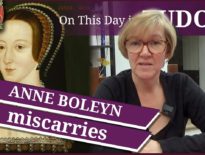On this day in history, 30th January 1606, Gunpowder plotters Everard Digby, Robert Wintour, John Grant and Thomas Bates were executed for treason at St Paul’s Churchyard.
Find out how they came to this end and hear a contemporary account of their executions in today's talk.
Also on this day in Tudor history, 30th January 1554, rebel Thomas Wyatt the Younger and his men besieged Cooling Castle. Here is my video from last year:
Also on this day in history:
- 1520 – Birth of Sir William More, member of Parliament, Protestant and son of Sir Christopher More, a powerful administrator in Henry VII's reign. More served Elizabeth I as Constable of Farnham Castle, Treasurer of the Lottery, Commissioner for Ecclesiastical Causes, Collector of the Loan, Chamberlain of the Exchequer, Master of Swans and Deputy Custos Rotulorum. He was also a commissioner on various commissions of oyer and terminer during her reign.
- 1531 – Death of Sir Robert Brudenell, Judge. He served Henry VII as King's Serjeant and Henry VIII as Chief Justice of the Common Pleas. He was buried at Deene church, Northamptonshire.
- 1593 – Ippolito Aldobrandini was elected as Pope Clement VIII.
Transcript:
On this day in history, 30th January 1606, conspirators Everard Digby, Robert Wintour, John Grant and Thomas Bates were executed at St Paul’s Churchyard. They’d been found guilty of high treason, along with their fellow surviving plotters, in a trial at Westminster on 27th January, and sentenced to death.
The plot they’d been involved in was the famous Gunpowder Plot, which had been exposed when Lord Monteagle received an anonymous tip-off just over a week before the state opening of Parliament was due to take place. The letter, thought to be from Lord Monteagle’s brother-in-law, Sir Francis Tresham, who had recently become a member of the plot, gave enough details for Lord Monteagle to go to Robert Cecil. Cecil took the news to the King, who ordered the cellars beneath Westminster to be searched. There, on 5th November 1606, Guy Fawkes was found red-handed with the evidence – 36 barrels of gunpowder. As I’ve explained before, the idea had been to blow up the House of Lords at the opening of Parliament on the 5th November, and to assassinate King James I, members of Parliament, the Lord and leading bishops, and to replace James with his daughter, nine-year-old Princess Elizabeth as a Catholic queen.
Guy Fawkes was arrested and tortured for information, but despite this failure, Robert Catesby, the leader of the conspirators, still attempted to incite armed rebellion in the Midlands. On the night of 7th November 1605, Catesby and fellow conspirators, Ambrose Rookwood, Henry Morgan and John Grant were injured in an explosion at Holbeach, a house on the Staffordshire border where they’d taken refuge, and the next day, Catesby, Rookwood and a few others were killed in a shoot-out with the Sheriff of Worcestershire’s men at Holbeach. Over the next couple of months, the surviving plotters were apprehended.
On this day in Tudor history, Thursday 30th January 1606, Everard Digby, Robert Wintour, John Grant and Thomas Bates were hanged, drawn and quartered at the west end of St Paul’s Churchyard. Sir Walter Scott shares an account of their ends in his “A Collection of Scarce and Valuable Tracts”, taken from a tract printed in 1606:
“Now, after their condemnation and judgment, being sent back to the Tower, there they remained till the Thursday following; upon sledges and hurdles they were drawn into St Paul's Church-yard, four of them, viz. Everard Digby, the elder Winter, Grant,and Bates, of whom I forgot to speak, having no great matter to speak of, but only that, being a villain, and hoping for advancement by the same, he had the reward of a traitor.
Now these four being drawn to the scaffold, made on purpose for their execution : First went up Digby, a man of a goodly personage, and a manly aspect, yet might a wary eye, in the change of his countenance, behold an inward fear of death ; for his colour grew pale and his eye heavy, notwithstanding that he inforced himself to speak as stoutly as he could. His speech was not long, and to little good purpose, only, that his belied conscience, being but indeed a blinded conceit, had led him into this offence, which, in respect of his religion, alias, indeed idolatry, he held no offence, but, in respect of the law, he held an offence, for which he asked forgiveness of God, of the king, and the whole kingdom ; and so, with vain and superstitious crossing of himself, betook him to his Latin prayers, mumbling to himself, refusing to have any prayers of any, but of the Romish catholics, went up the ladder, and, with the help of the hangman, made an end of his wicked days in this world.
After him went Winter up to the scaffold, where he used few words to any effect, without asking mercy of either God, or the king, for his offence ; went up the ladder, and, making a few prayers to himself, staid not long for his execution.
After him went Grant, who, abominably blinded with his horrible idolatry, though he confessed his offence to be heinous, yet would fain have excused it by his conscience for religion ; a bloody religion, to make so bloody a conscience ; but better that his blood, and all such as he was, should be shed by the justice of law, than the blood of many thousands to have been shed by his villainy, without law or justice. But to the purpose: having used a few idle words to ill effect, he was, as his fellows before him, led the way to the halter; and so, after his crossing of himself, to the last part of his tragedy.
Last of them came Bates, ' who seemed sorry for his offence, and asked forgiveness of God, and the king, and of the whole kingdom ; prayed to God for the preservation of them all, and as he said, only for his love to his master, drawn to forget his duty to God, his king, and country ; and therefore was now drawn from the Tower to St Paul's Church-yard, and there hanged and quartered for his treachery. Thus ended that day's business.”
The following day, Thomas Winter, Ambrose Rookwood, Robert Keyes, and Guy Fawkes were executed at the Old Palace Yard, Westminster.



Leave a Reply